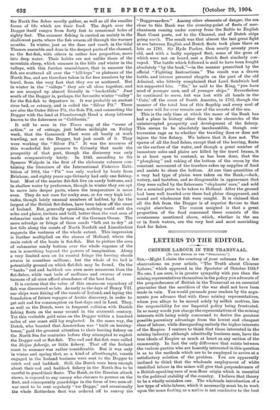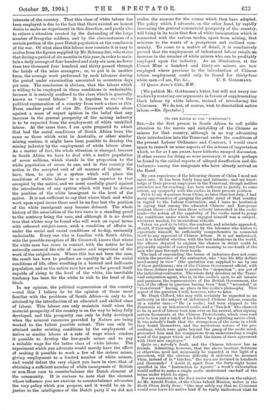CHINESE LABOUR IN THE TRANSVAAL.
Sin,—Might I claim the courtesy of your columns for a few observations on your article, " The Truth about Chinese Labour," which appeared in the Spectator of October 15th? No one, I am sure, is in greater sympathy with you than the mining representatives themselves in the policy you advocate of the preponderance of British in the Transvaal as an essential guarantee that the sacrifices of the war shall not have been made in vain. You would persuade your readers by the argu- ments you advance that with these mining representatives, whom you allege to be moved solely by selfish motives, lies the responsibility for our Imperial policy being frustrated. In so many words you charge the representatives of the mining interests with being solely concerned to derive the greatest possible pecuniary advantage from the lowest and cheapest class of labour, while disregarding entirely the higher interests of the Empire. I venture to think that those interested in the mining industry, although admittedly business men, have the true ideals of Empire as much at heart as any section of the community. In fact the only difference that exists between the various parties who are honestly interested in this question is as to the methods which are to be employed to arrive at a satisfactory solution of the problem. You are apparently inclined to think that the wholesale employment of white unskilled labour in the mines will give that preponderance of a British-speaking race of non-Boer origin which is essential to the political stability of the country. I believe that theory to be a wholly mistaken one. The wholesale introduction of a low type of white labour, which it necessarily must be, to work upon the same footing as a native is not conducive to the best
interests of the country. That this class of white labour has been employed is due to the fact that there existed an honest desire to make an experiment in this direction, and partly also to relieve a situation created by the disbanding of the large number of Irregular soldiers, and by the circumstances of a certain portion of the poor Dutch population at the conclusion of the war. Of what class this labour now consists it is easy to realise from the figures supplied by Mr. Schumacher, who states that during a period of six months in this year, in order to main- tain a daily average of four hundred and sixty-six men, no fewer than two thousand four hundred and thirty passed through the hands of the mine managers ; or, to put it in another form, the average work performed by each labourer during the period under examination amounted to seventeen days per man. The conclusion is obvious, that the labour which is willing to be employed in these conditions is undesirable, because it is entirely confined to the class which is generally known as " casual labour." It is hopeless to exr"ct the political regeneration of a country from such a class as this. From another point of view Mr. Cresswell stands alone against a mass of expert opinion in the belief that any increase in the general prosperity of the mining industry is to be expected from the employment of white unskilled labour. At the same time, I am quite prepared to admit that had the social conditions of South Africa been the same as those which exist in Australia, or other similar mining centres, it might have been possible to develop the mining industry by the employment of white labour alone. As a matter of fact, the whole situation is changed, because in South Africa we have to deal with a native population of seven millions, which stands in the proportion to the white population of seven to one, and in this country the native is the accepted unit of all manner of labour. We have, then, to aim at a system which will place the conditions of white labour in a position superior to that occupied by the native, and we must carefully guard against the introduction of any system which will tend to debase the position of the white immigrant to the level of the native. It is not sufficient to say that where black and white work upon equal terms there need be no fear lest the position of the white immigrant may become debased. The whole history of the association of the two races is a standing proof to the contrary being the case, and although it is no doubt true that whites may be found who will work on equal terms with coloured subject-races, such a condition of affairs is, under the social and racial conditions of to-day, eminently undesirable. Every one who is familiar with South Africa, with the possible exception of Mr. Cresswell, knows that where the white man has come in contact with the native he has naturally assumed the role of master and supervisor of the work of the subject-race. Where this has not been the case, the result has been to produce an equality in all the social conditions of life, often resulting in a bastard and half-caste population, and as the native race has not so far proved itself capable of rising to the level of the white, the inevitable tendency has been for the white to sink to the level of the black.
In my opinion, the political regeneration of the country —and this I believe to be the opinion of those most familiar with the problems of South Africa—is only to be attained by the introduction of an educated and skilled class of labour. This labour can only maintain itself when the material prosperity of the country is on the way to being fully developed, and this prosperity can only be fully developed when the mineral resources provided by Nature are being worked to the fullest possible extent. This can only be attained under existing conditions by the employment of native or similar labour at a rate of wage which renders it possible to develop the low-grade mines and to pay a suitable wage for the better class of white labour. The experiment which you advocate would merely have the effect of making it possible to work a few of the richest mines, giving employment to a limited number of white miners, and would defeat the very object you have in view, that of obtaining a sufficient number of white immigrants of British or non-Boer race to counterbalance the Dutch element of the community. It is curious to note that the element whose influence you are anxious to counterbalance advocates the very policy which you propose, and it would be an in- justice to the intelligence of the Dutch party if we did not the Rand. realise the reasons for the course which they have adopted. The policy which I advocate, on the other hand, by rapidly increasing the general commercial prosperity of the country, will bring in its train that flow of white immigration which is connected with the various trades, apart from mining, that minister to the wants of a prosperous and civilised com- munity. To come to a matter of detail, it is conclusively proved that the employment of indentured labour entails an increase in the number of white miners who can be profitably employed upon the industry. As an illustration, at the Comet Mine a hundred and thirty-six miners are now employed where previous to the introduction of Chinese labour employment could only be found for thirty-four
white men.—I am, Sir, &c., C. S. GOLDMANN. 34 Queen Anne's Gate, S.W.
[We publish Mr. Goldmann's letter, but will not weary our readers by restating our arguments in favour of supplementing black labour by white labour, instead of introducing the Chinaman. We do not, of course, wish to disestablish native labour.—En. Spectator.]
[TO TIIR EDITOR OF TUB SPROTATOR."



















































 Previous page
Previous page